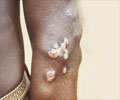Health Minister Tony Clement cut a ribbon to open an ultra-modern, $4 million infectious disease laboratory in Nairobi
Health Minister Tony Clement cut a ribbon to open an ultra-modern, $4 million infectious disease laboratory in Nairobi on Friday, almost all of which was paid for by the Canadian government.
The money is well spent, said Clement during the ribbon-cutting. He served as Ontario's health minister during the province's SARS crisis in 2003."Things can be tested here, research can be done here immediately, on the spot," Clement said. "That means we can have a quicker response as a world community to any infectious disease outbreak."
The International Centre for Infectious Diseases represents a new chapter in a 27-year collaboration between the University of Nairobi and the University of Manitoba. The lab will be able to handle highly infectious, deadly diseases such as Ebola, the Marburg virus and HIV/AIDS.
Once the equipment is in place, the facilities will be as good as any in Canada, said Dr. Frank Plummer, director of the National Microbiology Laboratory in Winnipeg. He was also in Nairobi for the opening.
In the 1980s, Plummer used more primitive technology for his HIV/AIDS research.
"We had a box that held our clinic supplies. We just took them back and forth every day," Plummer recalled. "And we had a car that we had to push start."
Advertisement
The lab is one of three such high-quality infectious disease laboratories in Africa, and the only one in east and central Africa. The region is one of the hotspots for infectious diseases on the continent.
Advertisement
For the Kenyans working at the lab, there are other advantages for up-and-coming researchers who will use the facilities.
"This is one facility that will help in a small way, but it is a bold and a big step forward," said Dr. David Mburu, manager of the lab of the International Livestock Research Institute in Nairobi.
Canadian researchers and those in partnering countries will use the facility to conduct research, respond to infectious disease outbreaks and promote global public health.
Source: Bio - Bio Technology
SRM











